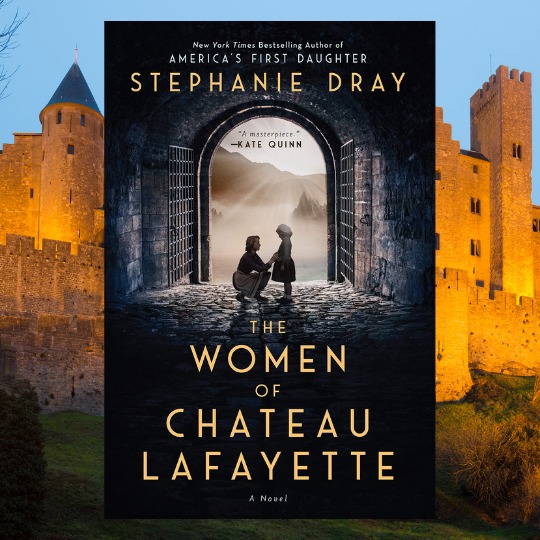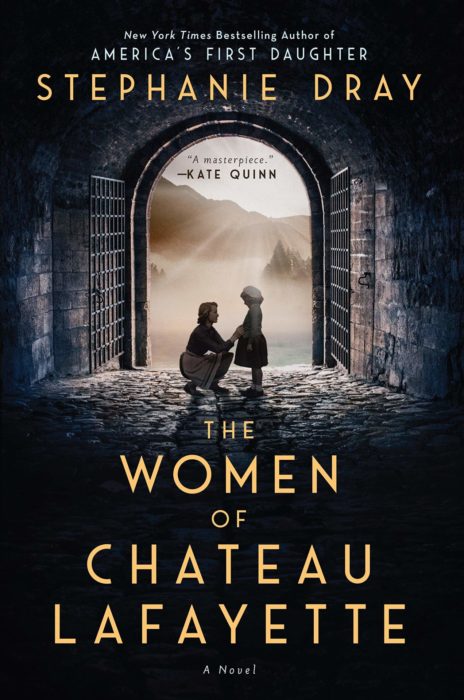We are so excited to bring you this exclusive excerpt from The Women of Chateau Lafayette by Stephanie Dray!
About The Women of Chateau Lafayette:
An epic saga from New York Times bestselling author Stephanie Dray based on the true story of an extraordinary castle in the heart of France and the remarkable women bound by its legacy.
Most castles are protected by men. This one by women.
A founding mother…
1774. Gently-bred noblewoman Adrienne Lafayette becomes her husband, the Marquis de Lafayette’s political partner in the fight for American independence. But when their idealism sparks revolution in France and the guillotine threatens everything she holds dear, Adrienne must renounce the complicated man she loves, or risk her life for a legacy that will inspire generations to come.
A daring visionary…
1914. Glittering New York socialite Beatrice Chanler is a force of nature, daunted by nothing—not her humble beginnings, her crumbling marriage, or the outbreak of war. But after witnessing the devastation in France firsthand, Beatrice takes on the challenge of a lifetime: convincing America to fight for what’s right.
A reluctant resistor…
1940. French school-teacher and aspiring artist Marthe Simone has an orphan’s self-reliance and wants nothing to do with war. But as the realities of Nazi occupation transform her life in the isolated castle where she came of age, she makes a discovery that calls into question who she is, and more importantly, who she is willing to become.
Intricately woven and powerfully told, The Women of Chateau Lafayette is a sweeping novel about duty and hope, love and courage, and the strength we take from those who came before us.
Frolic-Exclusive Excerpt:
ADRIENNE
Paris
April 1774
In the ancien regime into which I was born, obedience was the rule. Thus it is strangely gratifying now to remember that when I was very young—before deference and duty to my father became the hallmark of my character—it was my nature to question. Indeed, when I was a little child, my long-suffering maman once jested that my favorite word was why.
But, of course, she was the one who taught me to ask . . .
It was Maman’s habit to invite my sisters and me into her sumptuous gold and crimson chambers where, seated by the fire in her favorite upholstered armchair—the one with gilded arms and embroidered with fleur-de-lis—she instructed us with soft eloquence and a sense of justice to believe that though we were girls, we had a right to our own consciences. We certainly tried her patience in adhering to that principle in matters large and small. Little Rosalie’s violent tantrums, pretty Pauline’s aloof disdain, Clotilde’s refusal of all things feminine, and my persistent doubt in God.
Why must we go to church services?
Why do we not see, feel, and touch God, if he exists?
Why would a good God allow evil things to happen?
Only our eldest sister, the sweet and gentle Louise, was the perfectly faithful and biddable sort.
Yet only once do I remember my mother complaining of us. In a fit of exasperation she threw aside the veils that covered her pockmarked face and cried, “You girls are far less obedient than other children your age!”
My sisters cowered, but I argued, “If we are disobedient it is because you let us question. When we grow older, you will find us more obedient than other daughters because we will have come to understand the reasons for your commands.”
Maman liked my answer, and I drank in her approbation like a holy elixir, for my sisters and I loved our mother with passionate devotion—as if, by silent conspiracy, we could somehow compensate for the one unhappy fact of our lives: that my father did not love my mother at all.
Our father, Jean de Noailles, the duc d’Ayen—commander of the king’s guard—had little patience for his wife’s independence of mind. Thus, they went on as most married nobles in France did then, living separate lives. He with a mistress, court life, and scientific pursuits. She with books, religion, and domestic duties.
I had been given little reason to believe my own marriage would be different. And, on the day of my wedding, my father reminded me, “Marriage, Adrienne, above all, is a duty to your family.” My most important duty. So believed my father, a man with five daughters who needed sons. Since he could no longer get sons upon my mother—who had been viciously ravaged by smallpox—he’d set out to procure sons-in-law, entering into negotiations for my marriage before I turned twelve.
I was fourteen now. And on this, my wedding day, I hungered desperately for my father’s affection, or even a show of approval. Yet in preparing to give me in marriage, he did not smile like a sentimental patriarch. No, the duc d’Ayen’s dark gaze swept over my bridal attire like I was one of his guards on inspection. My gown was a heavy silver brocade, which shimmered like moonlight, the sleeves dripping fine lace. Glittering diamonds had been sewn into the bodice, and from my ears dangled more diamonds, these the size of quail eggs, for no expense had been spared.
My stays were pulled tight, my hair perfumed with pomatum, my locks ruthlessly teased and pinned. Then I’d been powdered just short of asphyxiation. All this must have met my father’s approbation, but my eager smile must have disconcerted him, for he said, “I bid you again to remember, the purpose of marriage is not romantic love.”
Not its purpose, perhaps; I knew my groom had been chosen primarily for his immense fortune and presumed virility, yet, quite happily, I was still young enough to believe love could be found under the careful watch of chaperones, in shy blushing smiles, halting conversation, and the agreeable pattern of freckles on my betrothed’s nose.
That was enough to make my wedding day welcome to me.
No doubt, my buoyant mood made my father wish to pull me back to earth. “Royals are in attendance and we cannot afford a single misstep.”
“Yes, Father,” I said, though I knew it was not my manners that worried him, for in our family, the gestures of a courtier were as natural as breathing. I knew how to behave because I was of the Noailles.
But my groom was a Lafayette.
Oh, the Lafayettes boasted distinguished persons in their line, but as provincial nobility with a crumbling castle in the mountains, they had no standing with the king. By contrast, my family was high in favor, filling at least a hundred royal offices. In Versailles, we had a home merely steps from the palace gates, and we boasted that in the city of Paris itself, the Hôtel de Noailles had room enough for the king to stable an entire regiment of his cavalry, then hunt fox without ever leaving the walls of our estate. Hence, in the course of ordinary events, a boy like Gilbert du Motier, the last of the Lafayettes, would never have been considered a worthy candidate for my hand. We would not have been matched but for a calamitous series of tragic deaths in his family that orphaned him and left him wealthy. Making him a candidate for my hand, because my father believed the sixteen-year-old could be taken into our family and molded. “Lafayette’s edges are rough,” my father said. “Still, edges can be filed down. He can be made into a Noailles, and it will be your task to shape him.”
“Yes, Father,” I said again, my head bowed with the weight of the only responsibility ever given to me. A responsibility I took to heart, for I still wished to make my father love me as if I’d been born a boy, capable of bringing glory to our family name.
It was for the same reason I had long ago stopped asking why.
Alas, thinking back upon the days of endless social and ceremonial visits leading up to our wedding, I couldn’t think of anything about my intended groom that I would shape differently. In young Lafayette, my father saw a timid, bookish provincial lad, seemingly incapable of witty repartee. Yet I saw a freckled boy with wild red hair, whose guileless nature seemed true purity of heart—a heart I wanted for my own.
Excerpted from The Women of Chateau Lafayette by Stephanie Dray, published by Berkley, an imprint of Penguin Publishing Group, a division of Penguin Random House, LLC. Copyright © 2021
About the Author:
Stephanie Dray is a New York Times, Wall Street Journal & USA Today bestselling author of historical women’s fiction. Her award-winning work has been translated into eight languages and tops lists for the most anticipated reads of the year. She lives near the nation’s capital with her husband, cats, and history books.













